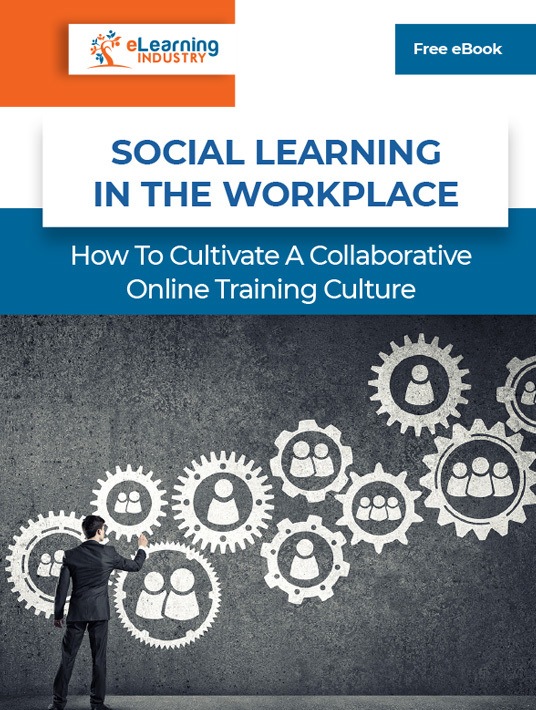Exposing Common Social Learning Myths
There’s no way to track peer-to-peer interactions. Social learning is all about impromptu conversations that occur organically. Social media is the crux of a successful strategy. These are just some of the untruths about social learning in online training. Misconceptions that may be preventing your organization from launching a collaborative eLearning program that facilitates knowledge sharing. These 7 popular social learning myths may be widely circulated, but they’re completely wrong. So, let’s debunk them today so that your employees, and the company’s bottom line, can enjoy the many perks of social learning theory.

1. Modern Social Learning Can Only Take Place On Social Media
Social media is the only platform you can use to deploy social learning in the digital era. However, video demos, peer coaching, and other interactive resources are part of the package. Platforms like YouTube or Facebook are valuable additions to your strategy, but they’re not the only course of action. If you do use these networking sites for social learning you must have guidelines in place to prevent misuse. For instance, employees might end up playing games or chatting with friends instead of participating in the discussion.
2. It Isn’t Measurable Or Feedback-Driven
There’s no way to measure social learning engagement because it’s impromptu and informal, right? The truth is that you can still monitor peer-based interactions and training performance in a social learning setting. LMS metrics, social media stats, and learner feedback are just some of the ways to identify gaps and areas for improvement in your strategy. You can even conduct assessments and surveys after social learning activities for enhanced analytics.
3. Only Tech-Savvy Employees Benefit From Social Learning
Social learning myths have a way of limiting online training potential. For example, you assume that only tech-savvy employees will benefit from this approach. So, you avoid it because you want to create an inclusive training environment. In reality, everyone enjoys the perks of social learning theory. Even tech newbies get to share experiences with peers and attend live events or watch demo videos during their work break. Social learning is not only for tech gurus who spend half their day on social media platforms.
4. It Is Always Unstructured And Informal
The only way to launch a social learning strategy is to let it happen naturally. Putting a bunch of employees in a room, or in an online discussion forum, and allowing them to strike up a conversation. In fact, social learning doesn’t always have to be unstructured or impromptu. It can consist of demo videos, scheduled live events, peer coaching groups, or other form activities. These elements are all part of a successful social learning curriculum. Of course, there’s also room for organic conversations that facilitate knowledge sharing, even if they aren’t pre-planned.
5. Social Learning Is A Fresh Concept
Social learning has only been around since social media came onto the scene. This common misconception sells the social learning theory short. Bandura introduced the model in the ’70s and cognitive/behavioral learning theories have been around for much longer. So, social learning is not a new concept nor is it rooted in the digital era. As a matter of fact, the basic premise behind the theory has nothing to do with technology. It’s all about human psychology, how we interact with others and respond to social stimuli, the way we observe others in their ‘natural habitat’ and mimic their reactions to achieve similar results. This model is based on primitive human mental processes and instincts. Technology is merely a tool that brought it into the modern era.
6. Live Demos Are The Only Way To Implement It
Some believe that social learning exists at the other end of the spectrum, as it’s doesn’t involve social media, but live demos. That the only way to reinforce behaviors is to show them in action. Yet again, that’s limiting the full potential of the social learning theory. There are numerous ways to implement this model in your online training strategy. From recorded events and tutorials to personal anecdotes and peer mentoring. Live demos are not the only way to teach tasks and correct unfavorable behaviors.
7. Personal Cognitions Have No Bearing On Social Learning
This isn’t a matter of ‘monkey see, monkey do.’ Learners must be able to assign meaning to the information and there are several factors involved, from their emotional state to personal assumptions. Even limiting beliefs and untruths they’ve committed to memory play a part. For example, they may have heard that the displayed behavior is inefficient or incorrect, or that they should follow another set of protocols to complete the task more effectively. Thus, the employee training participant’s frame of mind has a direct bearing on social learning. It’s crucial to set the tone and remove distractions from your course design. Test their assumptions with pre-assessments and polls. Then give them real-world examples of how to apply what they’ve learned so that they can tie it to workplace performance. Make it meaningful and personal.
These social myths are all wrong. However, most of them are based on simple misunderstandings. Now that you know the truth and all the benefits social learning theory can bring, why not sneak it into your strategy. Start with discussion forums and social media groups to ease into the process, then devise creative ways to boost collaboration and peer engagement. Consider hosting a meet and greet live events so that everyone can share their experiences and expertise.
Wondering what social learning is and how you can implement it in the workplace to motivate employees, facilitate knowledge sharing and talent development? Download our eBook Social Learning In The Workplace: How To Cultivate A Collaborative Online Training Culture and get to expose all the common myths around social learning!

